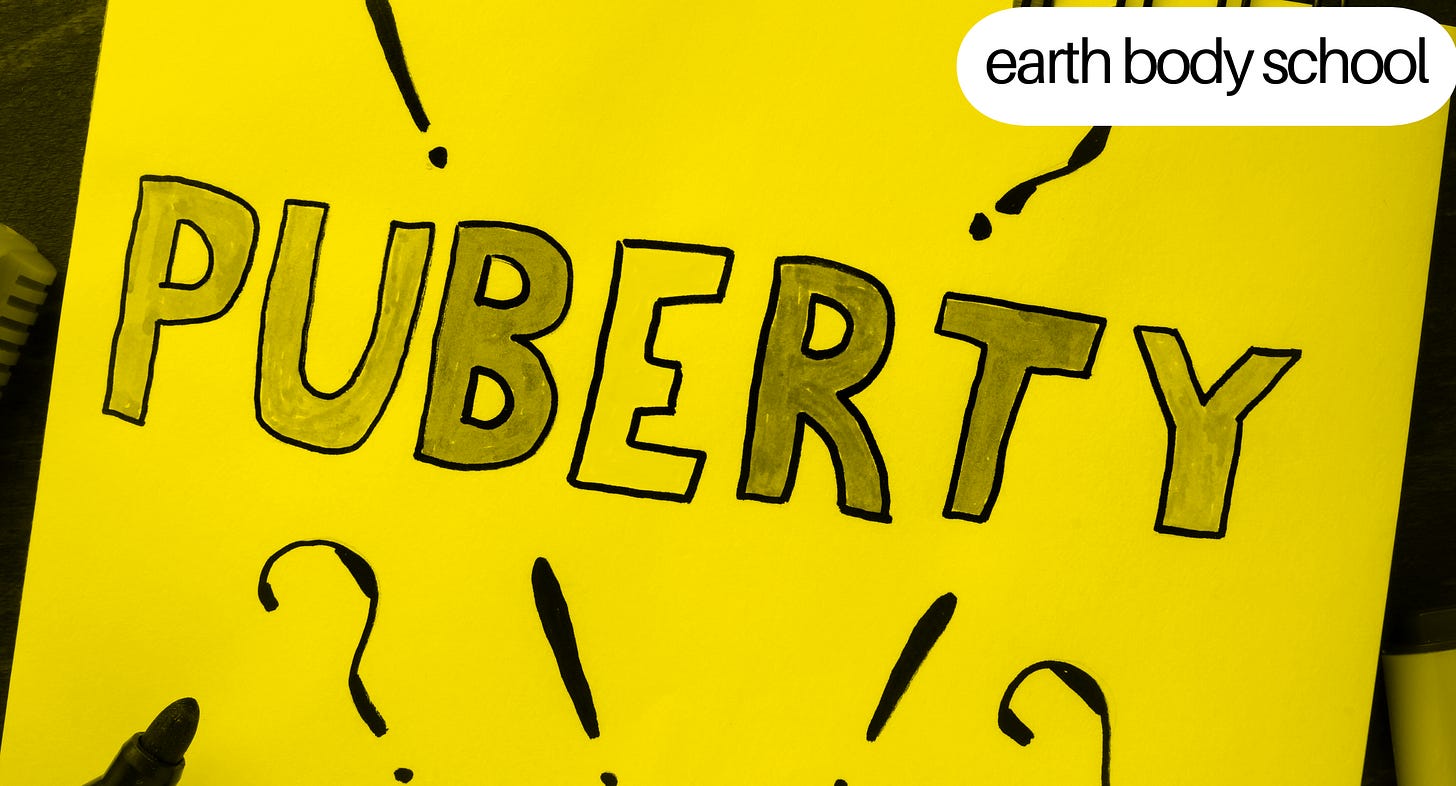Broaching conversations around periods, sex, and bodies can feel awkward and scary for teens and parents alike.
But you’re not alone!
This article aims to equip you with a plan to talk through the changes your teen is going through.
Before you get started…
We bring our own experiences of puberty to our conversations with our teens.
Take a moment to reflect on your own journey through puberty with these prompts:
How did you feel as a teenager about sex, periods, and body changes? Where did you get your information from?
Do you remember conversations with your caregivers around cycles/puberty?
Are there any conversations you wish happened differently?
What is puberty?
Puberty is the physical, emotional, psychosocial, and hormonal stage of life where developmental changes allow new abilities to emerge.
While the major systems involved in puberty are the reproductive and endocrine systems, puberty and the hormones involved affect nearly every system in the body.
Adolescence is a period of powerful transformation for the brain, and hormonally speaking, it’s not a straightforward escalation: it’s a roller coaster.
This can be a period of emotional changes and stress as both you and your teens adjust. A maturing brain and body affects friends and family alike.
Creating a plan
Consider these reflective prompts aim in preparation for dialogue with your teen about puberty and cycle health.
What additional questions do you have about hormone & reproductive health?
What resources can you look to in order to answer these questions?*
Who else in your social network might be a resource to you or your teen?
What are the key values and safe. principles you would like to communicate in these conversations?
What are some questions you’d like to ask your teen about their cycle health?
What are some moments in your routine with your teen that might provide opportunities to talk about hormone/reproductive health (i.e., commute from school, media, pregnancy announcement, etc.)?
*Visit earthbodyschool.com/teencycles for more book, article, and podcast resources on puberty.
Putting it into action
Normalizing conversations around cycle health: Use anatomically correct language when discussing body parts and functions, and make it clear that nothing is off-limits. For example, if your teen asks about periods, instead of using a euphemism like “Aunt Flo,” explain it clearly: “A period is a normal part of growing up for girls. It’s when your body sheds the lining of your uterus, and it’s something that happens every month.” Then the euphemisms can be an inside joke or code when needed.
Picking the right time & place: Sometimes direct eye contact can be too much for teens around more sensitive topics. So how can we get teens out of fight/flight mode? You may want to chat or ask questions during car rides or start from a place of nonverbal support. This could be sitting down next to them and offering food, tea, or hot chocolate. This could be saying generally supportive, open-ended statements.
“Potted Plant” Parenting: This is a proposition from psychologist Lisa Damour: what teenagers want is “potted plant” parents who are physically present and largely quiet and non-judgmental. Damour proposes that teens want to feel you there, witnessing - "on call" if needed to take action or start conversations. The presence is key: Damour cites additional research showing the psychological benefits for teens of having at least one parent around during the aſter school/dinner hours.
Tactical Support: In the early phases of puberty, consider being prepared for pragmatic questions such as:
What is it going to feel like when I get my period?
What do I do if I get cramps?
Can I still participate in swimming/sports if I'm bleeding?
How do I get my pad into my bag without someone noticing?
Can I sleep in my tampon?
How many hours can I wear a pad without changing it?
These questions may become more sophisticated as teens age, but initially, building plans and offering strategies can be very useful. You might also do this with questions that lead to some role-playing to help them develop language and confidence to set boundaries and assert their comfort levels.
Seeking another adult: Finding another trusted adult for your teen to reach out to with questions and concerns can be helpful for both you and your teen. Be sure this adult understands your values and has the correct information - you might also give them a heads up that your teen may be reaching out!
Ritual & celebration: Marking your teen's first period may help empower them as they navigate the changes of puberty. You might consider creating a ritual, creating a "first period" kit, or offering them a gift.
Is this normal?
In these conversations, you and your teen may have additional questions around what is normal, especially around cycle health.
During our adolescent years, the body is learning to regulate and have rhythm. These are foundational years for hormonal well-being.
At Earth Body School, we offer additional resources on teen hormonal health and body literacy on our website to support you and your teen in this time and beyond.
Visit earthbodyschool.com/teencycles to get additional FREE teen hormonal health & cycle support, including:
Body Talk: a guide to conversations with your teen about puberty and cycle health
A resources list that includes book & podcast recommendations, first period celebration ideas, and more
More information on cycle charting for teens
With gratitude,
Kate




